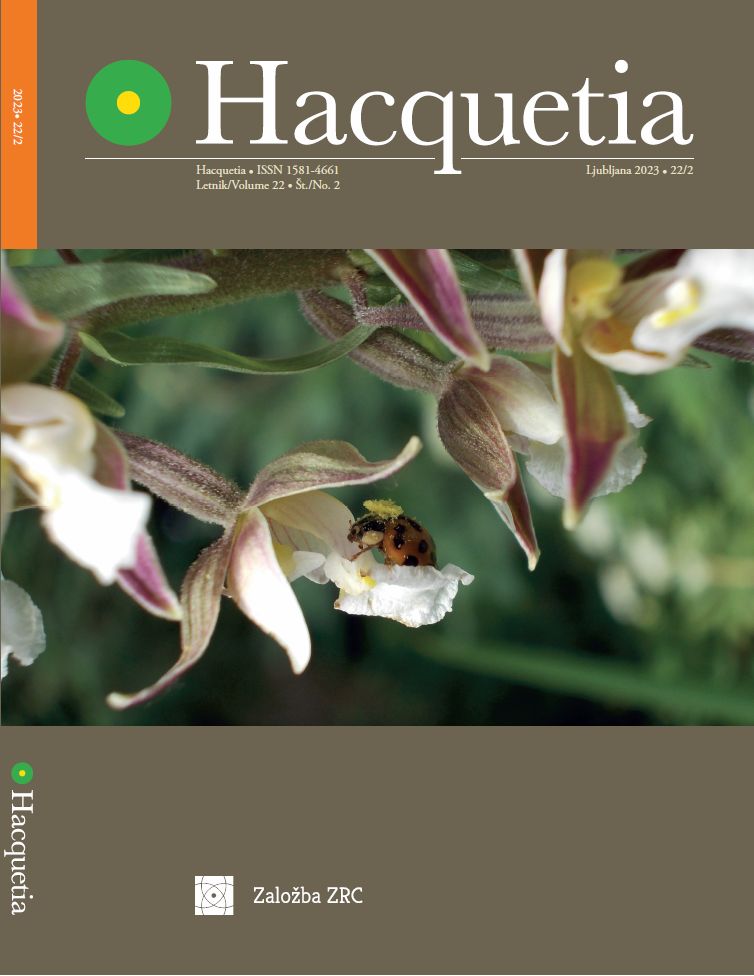Further data on the occurrence of two alien Leguminosae in Algeria
DOI:
https://doi.org/10.2478/hacq-2022-0017Keywords:
alien species, new record, Fabaceae, escaped, cultivation, degree of naturalization, invaded habitat, propagation, AlgeriaAbstract
During field surveys, carried out between 2021 and 2022 in northeastern Algeria, two populations of Tipuana tipu (Benth.) Kuntze were discovered. One population was located in the middle of a quite natural habitat in the Filfilla region (wilaya of Skikda). In this locality, the species seems more or less established and can be considered to be at the beginning of the naturalization process, a degree of naturalization not previously reported in Algeria and mainland North Africa. Our surveys also revealed several populations of Paraserianthes lophantha (Willd.) I.C. Nielsen, a species that was recently reported as naturalized in Algeria but for which details on its naturalization were lacking. We here describe the localities in which the two species were observed, present a map of their distribution, field photographs and a key for the identification of both genera.
Downloads
References
APD (2022). African Plant Database (version 4.0.0). Conservatoire et Jardin botaniques de la Ville de Geneve and South African National Biodiversity Institute, Pretoria, Retrieved Auguste 02, 2022, from http://africanplantdatabase.ch
Aymerich, P., & Saez, L. (2019). Checklist of the vascular alien flora of Catalonia (northeastern Iberian Peninsula, Spain). Mediterranean Botany, 40(2), 215‒242.
Brown, G. K., Murphy, D. J., & Ladiges, P. Y. (2011). Relationships of the Australo-Malesian genus Paraserianthes (Mimosoideae: Leguminosae) identifies the sister group of Acacia sensu stricto and two biogeographical tracks. Cladistics, 27, 380–390.
Brown, G. K., James, E. A., Simmons, C. I., & Ahrens, C. W. (2020). Recently naturalized Paraserianthes lophantha subsp. lophantha displays contrasting genetic diversity and climate relationships compared to native populations. Diversity, 12 (422),1‒20. https://doi.org/10.3390/ d12110422
Cruz, N. T., Morales, M. U., Rojas, E., & Joker, D. (2002). Tipuana tipu (Benth.) Kuntze. BASFOR. Dobignard, A., & Chatelain, C. (2012). Index synonymique de la flore de l’Afrique du Nord (Vol. 4). Conservatoire et Jardin Botaniques de la ville de Geneve.
El Mokni, R. & De Belair, G. (2020). Wisteria sinensis (Sims) Sweet in Tunisia and Algeria. In W. Greuter & Th. Raus, (Eds.), Euro+Med- Checklist Notulae, 12. Willdenowia, 50 (2), 305‒341. https://doi. org/10.3372/wi.50.50214
Flora and Funga of Brazil (2022). Tipuana in Flora e Funga do Brasil. Jardim Botanico do Rio de Janeiro. Retreived August 15, 2022, from https://floradobrasil.jbrj.gov.br/FB23207
Fosberg, F. R. (1965). Revision of Albizia sect. Pachysperma (Leguminosae-Mimosoideae). Reinwardtia, 7, 71–90. Galasso, G., Conti, F., Peruzzi, L., Ardenghi, N. M. G., Banfi, E., Celesti-Grapow, L., Albano, A., Alessandrini, A., Bacchetta, G., Ballelli, S., Bandini Mazzanti, M., Barberis, G., Bernardo, L., Blasi, C., Bouvet, D., Bovio, M., Cecchi, L., Del Guacchio, E., Domina, G., Fascetti, S., Gallo, L., Gubellini, L., Guiggi, A., Iamonico, D., Iberite, M., Jimenez-Mejias, P., Lattanzi, E., Marchetti, D., Martinetto, E., Masin, R. R., Medagli, P., Passalacqua, N. G., Peccenini, S., Pennesi, R., Pierini, B., Podda, L., Poldini, L., Prosser, F., Raimondo, F. M., Roma-Marzio, F., Rosati, L., Santangelo, A., Scoppola, A., Scortegagna, S., Selvaggi, A., Selvi, F., Soldano, A., Stinca, A., Wagensommer, R. P., Wilhalm, T., & Bartolucci, F. (2018). An updated checklist of the vascular flora alien to Italy. Plant Biosystems, 152(3), 556‒592. https://doi:10.1080/11263504.2018.1441197 GBIF (2022).
Global Biodiversity Information Facility, Checklist dataset, Paraserianthes lophantha (Willd.) Nielsen. Retrieved July 05, 2022, from https://doi.org/10.15468/39omei GNP (2022).
Growing Native Plants. Paraserianthes lophantha (Willd.) I. C. Nielsen. Information about Australia’s flora. Retrieved August 17, 2022, from https://www.anbg.gov.au/gnp/gnp9/paraseriantheslophantha. html
Hyde, M. A., Wursten, B. T., Ballings, P., & Coates Palgrave, M. (2022). Flora of Zimbabwe: Genus Tipuana. Retrieved April 12, 2022, from https://www.zimbabweflora.co.zw/speciesdata/genus.php?genus_ id=751
Impson, F. A. C., Kleinjan, C., Hoffmann, J., & Post, J. A. (2011). Biological control of Australian Acacia species and Paraserianthes lophantha (Willd.) Nielsen (Mimosaceae) in South Africa. African Entomology, 19, 186‒207. https://doi.org/10.4001/003.019.0210 ISSA (2022).
Invasive Species South Africa. Tipu tree, Tipuana tipu. Retrieved January 06, 2022, from https://invasives.org.za/fact-sheet/ tipu-tree/
Legume Phylogeny Working Group (LPWG) (2017). A new subfamily classification of the Leguminosae based on a taxonomically comprehensive phylogeny. Taxon, 66 (1), 44–77. https://doi. org/10.12705/661.3
Maire, R. (1987). Flore de l’Afrique du Nord (Vol. 16). Paul Lechevalier.
Meddour, R., Sahar, O., & Fried, G. (2020). A preliminary checklist of the alien flora of Algeria (North Africa): taxonomy, traits and invasiveness potential. Botany Letters, 167, 453–470. https://doi.org/10 .1080/23818107.2020.1802775
Mifsud, S. (2022). Paraserianthes lophantha – datasheet created on Jan-2009. Retrieved September 06, 2022, from https://www. maltawildplants.com/MIMO/Paraserianthes_lophantha.php
Nielsen, I., Guinet, P., & Baretta-Kuipers, T. (1983). Studies in the Malesian, Australian and Pacific Ingeae (Leguminosae–Mimosoideae): the genera Archidendropsis, Wallaceodendron, Paraserianthes, Pararchidendron and Serianthes (part 2). Bulletin du Museum National d’Histoire Naturelle, Adansonia, 4(5), 335–360.
POWO (2022). Plants of the World Online. Paraserianthes lophantha (Vent.) I. C. Nielsen and Tipuana tipu (Benth.) Kuntze. Facilitated by the Royal Botanic Gardens, Kew. Retrived August 25, 2022, respectively from https://powo.science.kew.org/taxon/urn:lsid:ipni. org:names:912944-1 and https://powo.science.kew.org/taxon/ urn:lsid:ipni.org:names:254607-2
Pyšek, P., Richardson, D. M., Rejemanek, M., Webster, G. L., Williamson, M., & Kischner, J. (2004). Alien plants in checklist and floras: towards better communication between taxonomist and ecologist. Taxon, 53(1), 131‒143.
Rathee, P., Chaudhary, H., Rathee, S., Rathee, D., & Kumar, V. (2010). Antidiabetic Potential of Fabaceae Family: An Overview. Current Nutrition & Food Science, 6(3), 161‒175.
Raus, T., & Zeddam, A. (2010). Leucena leucocephala. In W. Greuter & Th. Raus, (Eds.), Med-Checklist Notulae, 29 (pp. 196‒197). Willdenowia, 40, 189–204. https://doi.org/10.3372/wi.40.40205
Sakhraoui, N., Metalaoui, S., Chefrour, A., & Hadef, A. (2019a). La flore exotique potentiellement envahissante d’Algerie : premiere description des especes cultivees en pepinieres et dans les jardins. Biotechnologie Agronomie Société et Environnement, 23(2), 63‒73. https://doi.org/10.25518/1780-4507.17902
Sakhraoui, N., Metallaoui, S., & Chefrour, A. (2019b). Naturalisation d’Anredera cordifolia (Basellaceae) en Algerie. Flora Mediterranea 29,159–162. https://doi.org/10.7320/FlMedit29.159
Sakhraoui, N., Chefrour, A., & Metallaoui, S. (2019c). Naturalisation de Melia azedarach (Meliaceae) et premier signalement de Canna indica (Cannaceae) et Pelargonium zonale (Geraniaceae) en Algerie. Flora Mediterranea 29, 223–226. https://doi.org/10.7320/FlMedit29.223
Sakhraoui, N., Verloove, F., & Hadef, A. (2022a). First record of Ficus microcarpa (Moraceae) in Algeria. Hacquetia, 21(2), 347‒354. https:// doi.org/10.2478/hacq-2022-0008
Sakhraoui, N., Verloove, F., Essl, F., & Hadef, A. (2022b). First record of Austrocylindropuntia cylindrica (Lam.) Backeb. and first data about the naturalization of Austrocylindropuntia subulata (Muehlenpf.) Backeb. in Algeria. Bioinvasions Records, 11 (2), 351‒359. https://doi. org/10.3391/bir.2022.11.2.07
Salazar, R., & Soihet, C. (2001). Manejo de semillas de 75 especies forestales de América latina (Vol.2). CATIE. Tekdal, D. (2021). Plant genes for abiotic stress in legumes. In V. Pratap Singh, S. Singh, D. Kumar Tripathi, S. M. Prasad, R. Bhardwaj & D. Kumar Chauhan, (Eds.), Abiotic Stress and Legumes (pp. 291–301). Academic Press. https://doi.org/10.1016/B978-0-12- 815355-0.00015-1 TPD (2022).
Tropical Plants Database, Ken Fern. tropical.theferns.info. Retrieved April 12, 2022, from tropical.theferns.info/viewtropical. php?id=Tipuana+tipu
Vasconcelos, M. W., Grusak, M. A., Pinto, E., Gomes, A., Ferreira, H., Balazs, B., Centofanti, T., Ntatsi, G.,Savvas, D., Karkanis, A., Williams, M., Vandenberg, A., Toma, L., Shrestha, S., Akaichi, F., Ore Barrios, C., Gruber, S., James, E. K., Maluk, M., Karley, A., & Iannetta, P. (2020). The Biology of Legumes and Their Agronomic, Economic, and Social Impact. In M. Hasanuzzaman, S. Araujo, & S. Gill, (Eds.), The Plant Family Fabaceae. Springer. https://doi. org/10.1007/978-981-15-4752-2_1
Verloove, F. (2017). New xenophytes from the Canary Islands (Gran Canaria and Tenerife; Spain). Acta Botanica Croatica, 76, 120‒131.
Verloove, F., Aymerich, P., Gomez-Bellver, C., & Lopez-Pujol, J. (2019). Chorological notes on the non-native flora of the province of Tarragona (Catalonia, Spain). Butlletí de la Institució Catalana d’Histňria Natural, 83, 133‒146. http://dx.doi. org/10.2436/20.1502.01.18
Villari, R., & Zaccone, S. (1999). Paraserianthes lophantha (WiIld.) J. Nielsen (Mimosaceae) a new alien species naturalised to Sicily. FIora Mcditerranea, 9, 287‒290.
Weeds of Australia. (2022). Tipuana tipu (Benth.) Kuntze. Retrieved April 12, 2022, from https://keyserver.lucidcentral.org/weeds/data/ media/Html/tipuana_tipu.htm WFO (2022). World Flora Online, Paraserianthes lophantha (Willd.) I. C. Nielsen and Tipuana tipu (Benth.) Kuntze. Retreived April 12, 2022, respectively from http://www.worldfloraonline.org/taxon/wfo- 0001061750 and https://powo.science.kew.org/taxon/urn:lsid:ipni. org:names:254607-2)
Downloads
Published
Versions
- 2023-06-25 (6)
- 2023-02-23 (5)
- 2023-02-20 (4)
- 2023-02-16 (3)
- 2023-02-15 (2)
- 2023-02-09 (1)
How to Cite
Issue
Section
License
Copyright (c) 2023 ZRC-SAZU

This work is licensed under a Creative Commons Attribution-NonCommercial-NoDerivatives 4.0 International License.
Authors guarantee that the work is their own original creation and does not infringe any statutory or common-law copyright or any proprietary right of any third party. In case of claims by third parties, authors commit their self to defend the interests of the publisher, and shall cover any potential costs.
More in: Submission chapter













